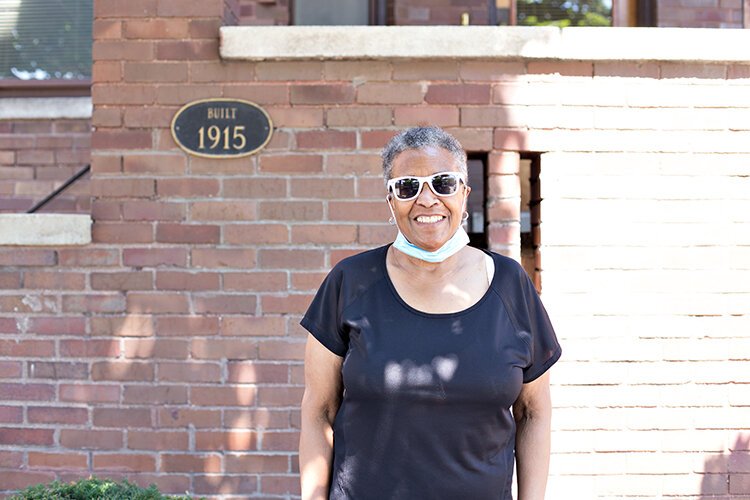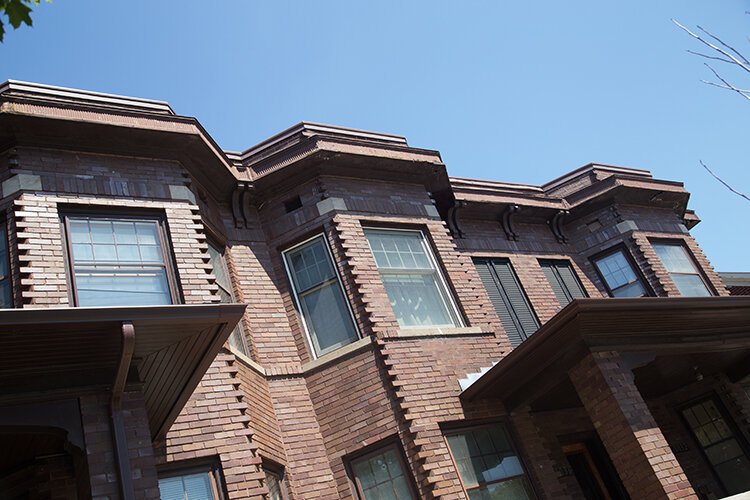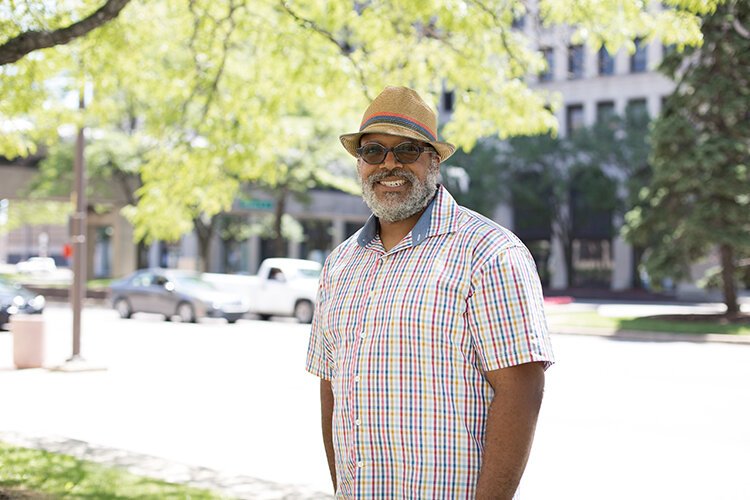Partner Partner Content 0%-interest loan program puts economic power in hands of Detroit homeowners
Sandra Cavette is one of 1,048 homeowners in Detroit who have used a 0% interest home repair loan program to maintain historic properties throughout the city. Long-term residents like Cavette have seen the city through its ups and downs and are investing in its future through the program, which launched five years ago and has generated $10 million in funding.

Sandra Cavette loves her historic home in downtown Detroit. She has lived in the 1915 brownstone house for nearly 35 years and she admires its bay windows, masonry fireplace, and oak wood paneling. But she’ll be the first to admit that the home needs constant attention.
“When you have an older home you always have work to do,” she says. “You just plan it into your budget, I had to budget every year for something.”
Cavette, who describes herself as an “original Flintstone” as a nod to her childhood in Flint, is now a—very happily—retired health care professional. She has seen Detroit go through some highs and lows and during her career worked for several hospitals, the Detroit Health Department, and for General Motors on an employee health program.
Cavette purchased her home for $47,000 in 1986 after a foreclosure, and saw potential in the neighborhood. Her instincts paid off.
“Now, I can walk across the street and catch the bus to jazz concerts and Campus Martius, I can walk downtown,” she says. “One of my best friends got a house down the street.”
She’s watched the area grow over the past three decades, attracting an increasingly younger demographic of homeowners, but it’s been a slow process. In the last two years in particular she’s seen more bike routes, pedestrian traffic, and visitors making the most of the city’s QLine public transport.
“It’s got a lot going for it,” she says. “We predicted this would happen but it took longer than we thought, with all the economic setbacks.”

Cavette worries, however, that the historic houses in her neighborhood could prove too much work for homeowners. “The old homes are going to die because no one’s doing the brick-and-mason shopping.”
That’s where a 0% interest home repairs loan program, offered by Local Initiatives Support Corporation (LISC) Detroit, is helping residents. Cavette first heard of the program, which offers 10-year, interest-free loans, from a neighbor two years ago. She wanted to do some remodeling, specifically putting in new steps and updating the kitchen and bathrooms in her 105-year-old property, and decided to apply.
“I put a lot of investment in it to keep it up to snuff,” she says. “But my appliances were on life support.”
“I went down to Hannan House, filled out an application, and a couple of months later I went for an interview and I got $25,000,” she explains. “It was really a blessing.”
LISC Detroit launched the 0% Interest Home Repair Loan Program in April 2015, and provides $5,000 to $25,000 to help Detroit homeowners make repairs and invest in their residences. The initiative developed out of the city’s aim to stabilize the housing market and meet an imbalance in the system, explains LISC home repair coordinator Damon Thompson.
“Homeowners were being shut out of the market, unable to access credit,” Thompson says. “According to Zillow, in 2013 around 80% of applicants were being denied loans. We looked at FHA-backed home improvement loans and there were 460 approved out of 2284.”
“One of the challenges was the access to home improvement capital, usually because of insufficient collateral or poor credit.”

A city-led partnership with LISC and Bank of America was formed, designed to help homeowners address health and safety issues, fix their homes, and eliminate blight. The initiative draws from a Community Development Block Grant through the City of Detroit, private funding from Bank of America, and in 2019 Quicken Loans joined the partnership.
Applicants are required to have lived in the residence for at least six months and loans are paid back over 10 years, with a $150 closing fee. Homeowners need a minimum credit score of 560 and a debt-to-income ratio of less than 45% to apply.
Now five years in, 1,048 homeowners have been approved for lending through the $21 million loan fund program, which has distributed more than $10 million through the 518 completed projects to date. The average loan amount has increased to approximately $22,000 and the most popular renovation is, by far, work done to repair roofs and windows.
Thompson says the use of a loan, rather than a straight grant for home repairs, means less wait times, faster access to funds, and more recipients.
“[The program] allows the city to make the greatest possible impact with limited funds on neighborhoods across Detroit in all council districts,” he says.
Bank of America has invested more than $8 million in the initiative as part of a larger goal for the bank to support economic mobility in metro Detroit, says Senior Vice President Tiffany Douglas.
“As the birthplace of makers, doers, and tinkerers, and a renaissance city, Detroit is a critical location to invest,” says Douglas, a Detroit resident for 20 years. “This is just one program that helps maintain a safe and sustainable place from where your journey begins each day, at home.”
Cavette says while she still would have continued to repair her home without the loan, it would have been significantly less extensive, and a “piecemeal” process. She also sees the overall improvement to the city’s neighborhoods, but wishes that more people knew about the initiative.
“There is a need,” she explains. “You find that you don’t have a neighborhood going into disrepair because people can afford a loan — it makes it possible.”
For her though, the most reassuring part of the loan program was the reliability of the contractors. The program has an approved contractor list for recipients to choose from and Thompson estimates over 60% are locally based minority companies.
“They have an understanding of homeownership here,” says Thompson. “And what it means to live and work in the city of Detroit. Those dollars are going right back into the city.”
“They engage you right away,” Cavette says, admitting that trusting contractors has been an issue in the past.
“As a layman you don’t know if a contractor is doing something according to plan,” she says. “Maybe my expectations were not high enough for a public program, but I haven’t encountered one that has this kind of follow-up.”
“This is a program that runs how our government should run—with checks and balances. I felt comfortable I didn’t have anything ‘rigged up.’ What that allowed me to do was have a level of comfort that this was a good investment.”
Finding enough contractors to meet those standards though, is often an issue. Thompson explains that because the initiative is competing against the private market, there’s always a need for qualified, quality workers.
“This isn’t just a problem in Detroit, but nationwide,” he says.
Cavette also worries about the impact COVID-19 will have on the program, saying she appreciated the notice she received from the loan program offering a six-month deferred payment during the pandemic.
“They were being sensitive to people who couldn’t meet payments,” she said. “I thought that was really great.”
COVID-19 forced the program to pause in March, when 70 homeowners were in the process of conducting inspections or starting construction. That work will resume soon, but Thompson laments that April to November would have been prime construction season.
There have, however, been some small silver linings. With employees and lending partners working remotely and utilizing electronic tools, such as e-signatures, Thompson believes the pandemic may alter the way they do business in the future.
“It may actually resolve some issues in a positive way,” he says.
With all the changes she has witnessed, in her home, on her block, and in her city, Cavette also believes Detroit can be resilient.
“We will survive this too.”

This is part of a series supported by LISC Detroit that chronicles Detroit small businesses’ journey in response to the COVID-19 pandemic.





